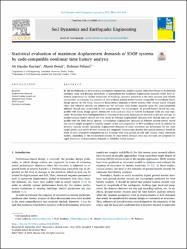Statistical evaluation of maximum displacement demands of SDOF systems by code-compatible nonlinear time history analysis
Citation
Kayhan, A. H., Demir, A., & Palanci, M. (2018). Statistical evaluation of maximum displacement demands of SDOF systems by code-compatible nonlinear time history analysis. Soil Dynamics and Earthquake Engineering, 115, 513-530. doi:10.1016/j.soildyn.2018.09.008Abstract
By the developments in structural and earthquake engineering, modern seismic codes have begun to recommend nonlinear static and dynamic procedures to approximate the maximum displacement demands which have uttermost importance for seismic assessment of buildings. Dynamic procedure is the most accurate and reliable among them and requires the selection of real/artificial ground motion records compatible to considered elastic design spectra. In this study, maximum displacement demands of SDOF systems with various lateral strength ratios and vibration periods are determined via nonlinear time history analyses using the code-compatible different records sets constructed by real accelerograms. For this purpose, 30 ground motion record sets compatible with elastic design spectra defined for each local soil class in Turkish Earthquake Code are used separately. Evaluations have highlighted that i) variation of maximum displacement demands in the sets are high; ii) Distinct ground motion record sets may result in different displacement demands even though they are compatible with the same design spectra; iii) maximum displacement demands of different ground motion record sets can be simply accepted as random samples of the same population at 95% confidence level. In addition to dynamic analysis results, maximum displacement demands of static procedure are determined for the same target spectra and results of both methods are compared. Comparisons showed that special attention should be made to static procedure estimations for the buildings with long periods on stiff soils. Finally, linear regression models, depending on the fundamental periods for each lateral strength ratio and soil type, are proposed for rapid prediction of displacement demands in reliability based manner.


















